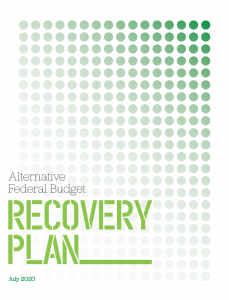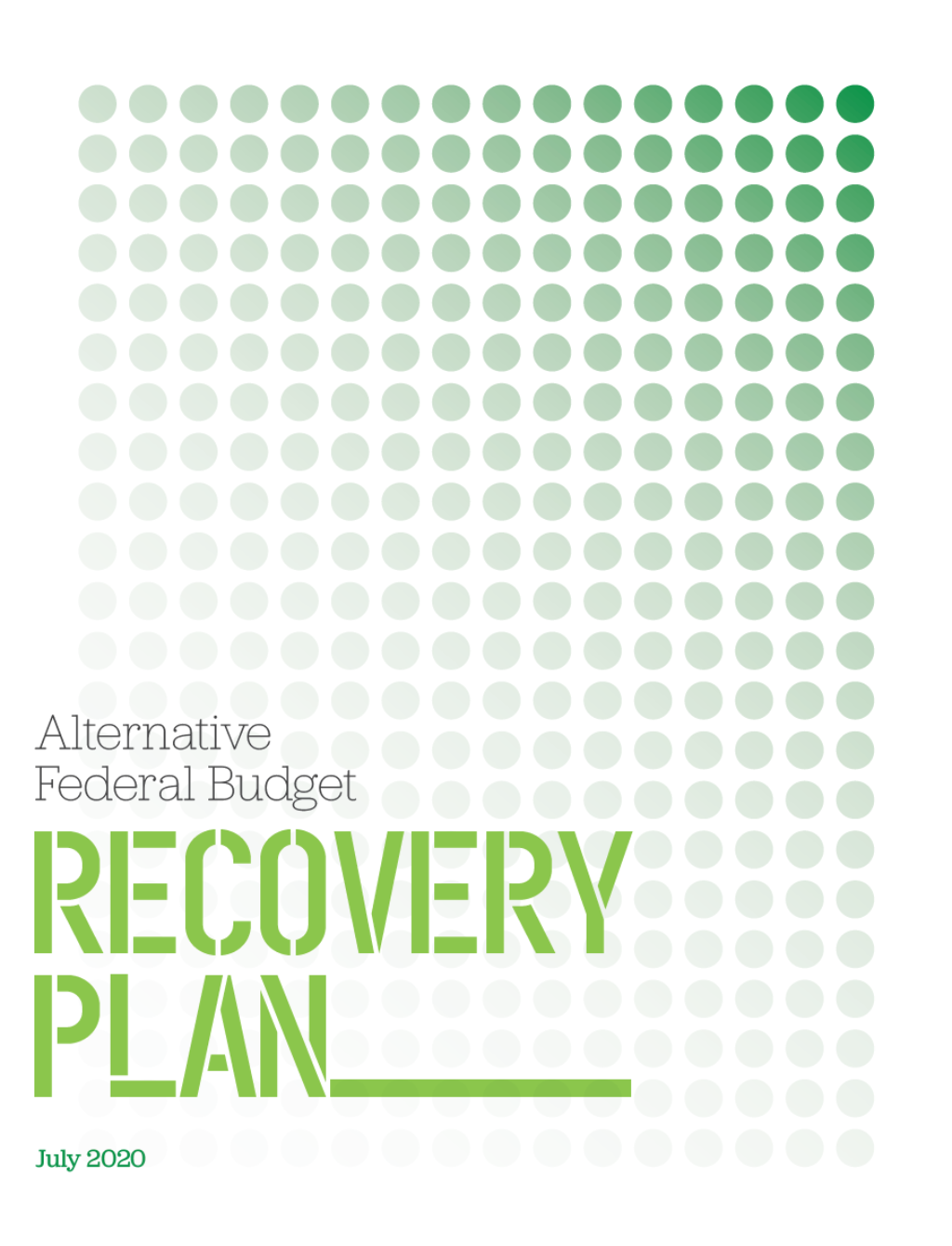 In 25 years of Alternative Federal Budgets, this edition of the AFB stands out: reflecting a chapter of history as it is unfolding, in real time, in the middle of a global pandemic.
In 25 years of Alternative Federal Budgets, this edition of the AFB stands out: reflecting a chapter of history as it is unfolding, in real time, in the middle of a global pandemic.
Future generations will look back at 2020 as a critical turning point, a year in which the systems that sustain our societies were put on trial and, in many cases, failed. Everything that comes next will be influenced by this moment. And in this moment we have choices about where we go from here.
COVID-19 ground the world’s economy to a halt as countries shut down to prevent the pandemic’s spread. Planes no longer flew overhead. Global supply chains stalled then reconfigured. Greenhouse gas emissions dropped, at least temporarily, highlighting the irrefutable link between how we live and climate change. Most importantly, billions of lives have been disrupted, more than half a million lives lost.
To varying degrees, governments stepped up where the market failed. Where they were carefully enacted, planned economic shutdowns helped “flatten the curve.” In some cases, income supports for workers in the most affected sectors have temporarily raised living standards from where they were a year ago.
In other cases, governments have utterly failed to protect their people. Canadians have watched in horror as the U.S. infection rate spikes in the wake of hasty economic reopenings in southern and western states. A new cycle of police brutality has exposed the deep-set racial injustice in that country, but also launched an international antiracist movement for systemic change.
Here in Canada, we are guilty of racial, ethnic, and Indigenous injustices, too. The inequities that were baked into our systems have been exposed and exacerbated by COVID-19.
Workers in the service sectors, retail and supply, and care work have been deemed essential, but they remain among the lowest-paid and least protected workers in Canada. It is no accident that they are disproportionately racialized, immigrants, migrant workers, and women. The impacts of COVID-19 on women’s work are so immense there is a threat to equality gains secured decades ago. We must do better.
In metropolitan areas, dense low-income communities and people in crowded housing situations—where there is less ability to physically distance—were harder hit by the pandemic. These are communities that are racialized, that are home to immigrants and historically marginalized peoples. We must do better.
Then there are the long-term care homes, staffed by low-paid personal support workers who are often forced into piecemeal work at multiple facilities, where COVID-19 outbreaks proved catastrophic. We must do better to protect the people who live in, work in, and visit Canada’s nursing homes and other care facilities.
Migrant workers, too, require our immediate and full support. For too long, they have been living in crowded housing, with poor labour protections, as they toil in farm fields to secure Canada’s food supply. We must do better for them and the workers in crowded meatpacking facilities whose employers failed to protect them with physical distancing measures.
Let’s be clear: a pandemic was never a question of “if” but a question of “when.” Lessons from SARS in the early-2000s taught us that we should prepare. Public health officials warned, year in and year out, that we should prepare. Government austerity agendas—fuelled by neoliberal ideology that privileged the “free market” over public health and community well-being—left us unprepared, and expected women and families to pick up the slack.
The same governments that ignored the warnings have pursued an expanding trade agenda that deliberately constrains our ability to intervene in the economy or the environment. Proponents of this agenda promised it would lead to “jobs, jobs, jobs,” rising productivity, and sustainable economic growth. The actual results do not bear this out. In fact, the COVID-19 crisis has exposed Canada’s disproportionate reliance on the export of raw and semi-processed resources, notably fossil fuels.
The pandemic has both exposed deep systemic issues and presented us with a golden opportunity to fix so many areas of public policy. The AFB Recovery Plan is a collective blueprint for how Canada can get through this crisis in the short, medium, and long term. It closes the chapter on the old normal.
The old normal was unacceptable because it left far too many people behind. It led to preventable suffering and premature deaths. Moreover, the old normal was putting us at much higher risk of natural disasters, and on track to making our planet unliveable.
This pandemic is forcing us into a new chapter of history. We will be judged by what we do next. And we will be judged by what we fail to do.
COVID-19 exposed the impossibility of a healthy economy without a healthy society. The status quo is no longer an option. This is our chance to bend the curve of public policy toward justice, well-being, solidarity, equity, resilience, and sustainability. These are not just words. These are the conditions upon which we rebuild. The majority of Canadians are already there—will our governments read the room?
The AFB Recovery Plan isn’t solely focused on the economy, as though economic issues can be disconnected from everything else. Rather, it adopts a Health-in-All-Policies approach. Because if this pandemic has taught us anything, it’s that public health is the requirement for economic health.
The AFB Recovery Plan charts a course toward equity. In what follows, we promote a vision for Canada that includes a caring economy plan, an income support plan, a healthier communities plan, and plans targeting key sectors that are most impacted by the pandemic and related economic slowdown. Importantly, as in past AFB projects, we also outline a path toward fiscal health, answering the question: how do we pay for the transformation this moment in history demands of us.
We understand the weight of this moment in history and we are ready to act in the best interests of the public at a time when that is what we require most from governments.
The AFB 2020 Recovery Plan is a collaboration among organizations and researchers from a variety of sectors, populations, and areas of expertise including human rights, labour, environmental protection, anti-poverty, arts and culture, social development, child development, international development, women, Indigenous peoples, the faith-based community, students, teachers, education, and health care workers.







